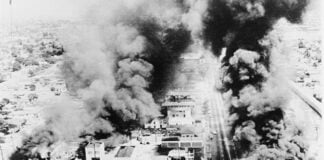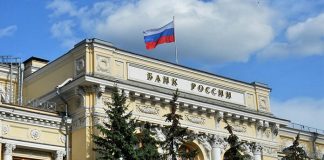Review: Watchmen
Directed by Zack Snyder, in cinemas now
The Watchmen are masked superheroes vigilantes whose presence has dramatically altered the course of history. In this alternate world, it is 1985 and Richard Nixon has been elected for an unprecedented third term. The “Doomsday Clock” is at consistently five minutes to midnight, representing the continual threat of a nuclear war between the United States and USSR.
The Watchmen are descendants of a similar group of superheroes called the Minutemen from the 1940s. They were involved in many key events in history. They assassinated John F Kennedy and were used by the US government to win the Vietnam War. The ruthless brutality of US imperialism is well captured in the film’s depiction of the role of its supermen in Vietnam. But now President Nixon has wound up their activities and made masked vigilantes outlawed.
Only Dr Manhattan continues to work for the US government. Manhattan is a god-like hero, formed by accident in a nuclear research facility. He has true super powers. He is able to see the past and the future and able to manipulate matter. He glows with blue luminescence and can teleport from place to place, alter objects and make copies of himself.
His presence temporarily prevents nuclear war, but has given the US a decisive upper hand in the Cold war. The Soviet Army is left waiting on the Afghanistan border, scared to pursue an invasion after a threat of retribution from Dr Manhattan. But his ability to see forward in time leads Manhattan to believe that a nuclear exchange is unavoidable.
Secret plan
The movie begins with the murder of a Watchman known as The Comedian; a nasty individual who worked for the US government in the 1970s knocking over left-wing republics in Latin America.
Another Watchman, Rorschach, who continues to wear a woolen mask, believes that someone is setting out to murder all the remaining superheroes.
Another main character, Adrian Veidte, also known by his alter ego name of Ozymandias, considers himself to be the smartest person alive. He has great political and economic power. His powerful corporation is about to develop and produce “free” renewable energy with the help of Dr Manhattan. Veidte claims that this will eliminate the need for countries to go to war.
As the Doomsday clock gets nearer to midnight, Dr Manhattan is accused of causing a fatal cancer in his previous research assistants. As a result, he travels to Mars. This allows a Soviet invasion of Afghanistan and pushes the world closer to nuclear war. Manhattan is detached from humanity and unwilling to return to earth and prevent a nuclear war, despite the pleas of his ex-girlfriend, Silk Spectre.
Meanwhile, after an attempt on Veidte’s life, Rorschach enlists the help of Nite Owl and Silk Spectre to uncover the conspiracy to kill Watchmen. The trail leads to Veidte himself, and we discover all is not what it seems. Veidte’s plans for free, renewable energy cover something more sinister—a plan that treats human race as sheep, to be frightened and herded into world peace.
The film portrays war as an inevitable part of human nature, which only heroes acting behind the scenes are capable of preventing.
The desire for an end to war reflects the concern during the Cold War about the threat of nuclear armaggedon. But as we have seen in recent years with the US’s “war on terror”, since the end of the Cold War the struggle for an end to war is no less pressing.
Yet the murkiness of the Watchmen’s morality invites us to question their efforts to keep the world from nuclear war. The Comedian is shown in flashback firing teargas on anti-war demonstrators, as well as committing rape. Dr Manhattan is seen terrorising Vietnamese villagers.
Rorschach is angry, misanthropic and inclined to solve problems with violence, but ultimately proves to care more about humanity as a whole than both the god-like Dr Manhattan and the cynical genius Veidte.
By the end of the movie, the Watchmen are revealed as flawed characters. They are imperfect figures to rely on, not to mention place the fate of humanity in.
The problems of humanity would be better solved by ordinary humans and a struggle to put an end to the system of imperialism which causes wars, not by superheroes.
Duncan Cassidy





